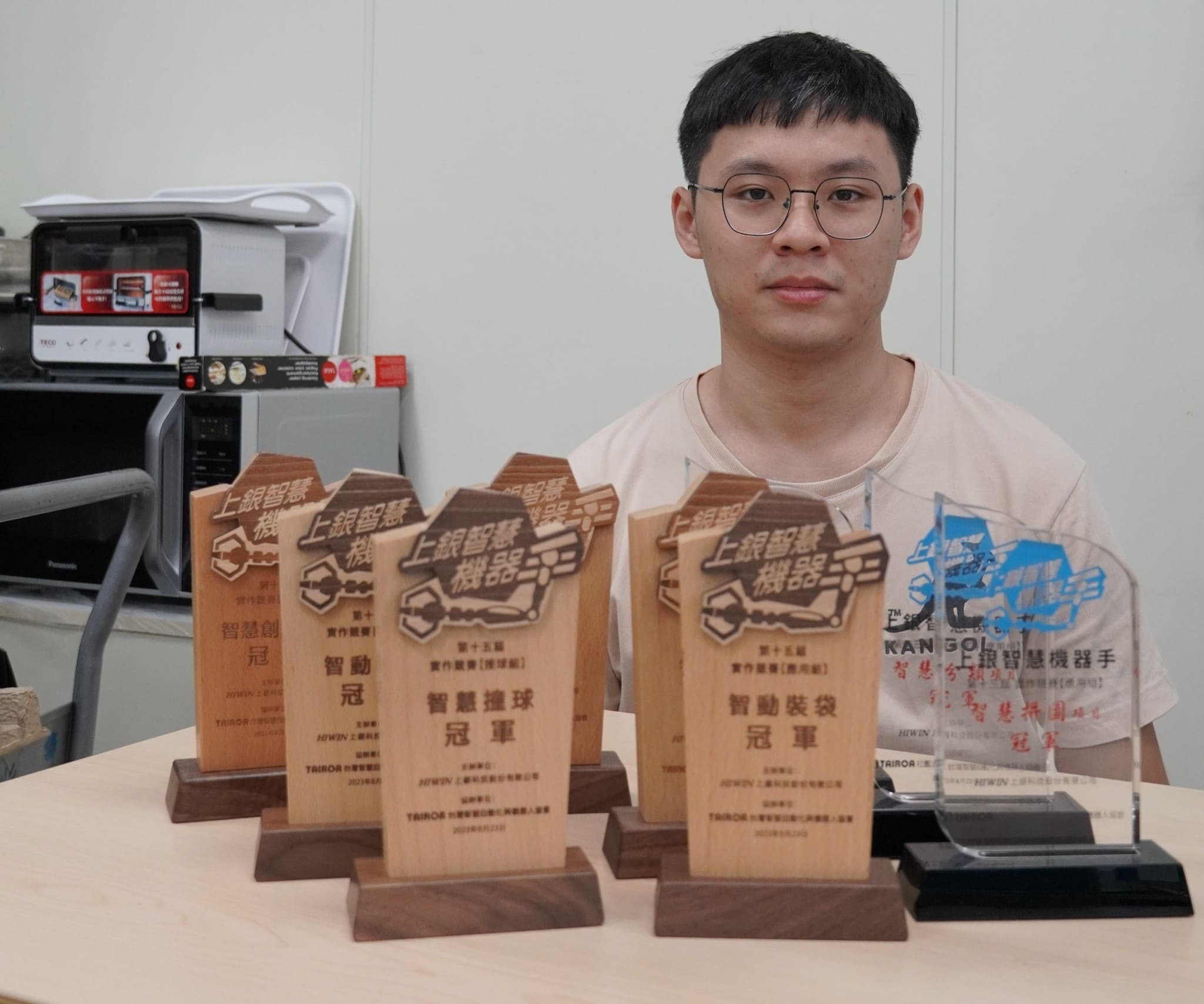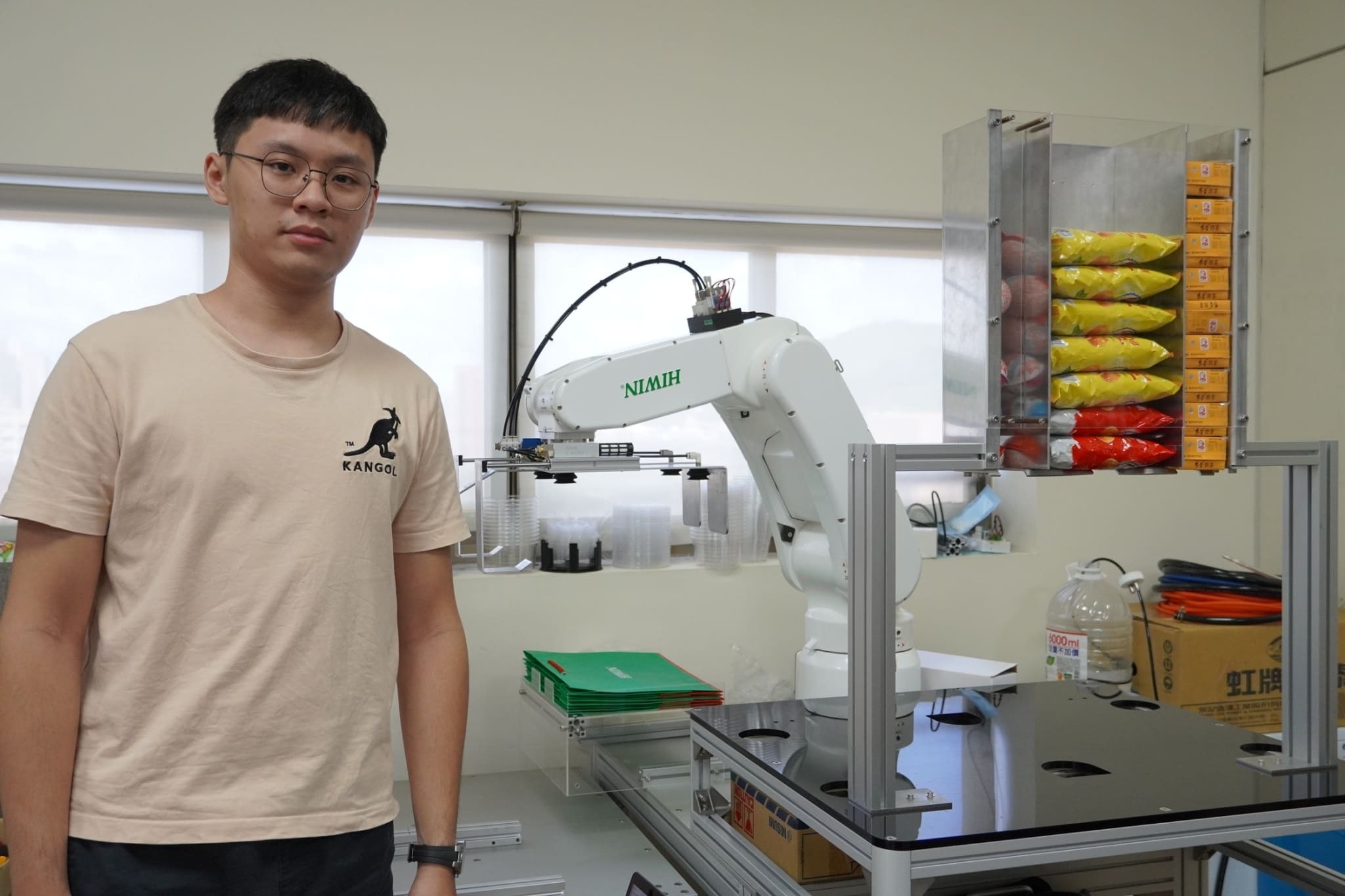Bo-Sheng Huang from Taiwan Tech, who is skilled in billiards, has won the Wisdom Billiards Championship for three consecutive years.
Taiwan Tech achieved a complete victory in the 112th Hiwin Intelligence Robotic Competition this year. Bo-Sheng Huang, a first-year graduate student from the Department of Electrical Engineering, and You-Ze Zhou, a sophomore with an undecided major, formed a team called “Next Team”. They won the championship in the categories of Smart Cup Dispensing, Smart Bagging, and Smart Billiards, earning a total prize of 270,000 NTD. Notably, in the Applied category, they won the championship in both the Smart Cup Dispensing and Smart Bagging projects, with the second and third places remaining vacant. Further, Huang Bo-Sheng has won the Smart Billiards award for three consecutive years.

During the award ceremony for the 112th Hiwin Intelligence Robotic Competition Smart Billiards Championship, student Bo-Sheng Huang (center) and team member You-Ze Zhou (right) received the championship prize.
Regarding their achievement of clinching the championship in the “Smart Billiards” project, for three consecutive years, Bo-Sheng Huang mentioned that he does not physically strike the billiard balls. Instead, he possesses the knowledge to utilize image processing programs and integrate hardware and software, allowing him to operate the robotic arm to strike the billiard balls.
Taiwan Tech's first-year electrical engineering graduate student, Bo-Sheng Huang, captured in a group photo with his medals from the Hiwin Intelligence Robotic Competition, a feat he has achieved for three consecutive years.
Huang Bo-Sheng highlighted that in previous years, the Hiwin Intelligence Robotic Competition emphasized programming skills. However, this year witnessed a notable shift towards focusing on hardware, specifically the mechanical apparatus, for handling intricate robotic arm movements. He expressed deep gratitude to HIWIN for providing the team with access to the robotic arm for practice before the competition, enabling them to perform with confidence. He also extended his appreciation to Professor Guo-Chang Wu for granting access to laboratory facilities like 3D printing and laser cutting, as well as for consistently sharing valuable industry insights, greatly enriching his knowledge.
Huang Bo-Sheng analyzed that the competition environment differed from the laboratory setting, making it challenging for many teams to adapt and adjust their roles accordingly. He personally took a hands-on approach before the competition, rigorously considering various possibilities and conducting multiple scenario simulations. Through these efforts, he fostered strong teamwork and achieved remarkable results in each competition with different teammates.
Professor Guo-Chang Wu, serving as the advising professor for the Bachelor's Program in Applied Science and Technology at Taiwan Tech, expressed not only joy and pride for Bo-Sheng Huang's three championships in this year's Hiwin Intelligence Robotic Competition but also a belief that the accolades were well-deserved. He shared the experience of observing Bo-Sheng Huang's preparations for the competition every summer, facing the varying challenges meticulously crafted by the organizers. Regardless of the complexity, Bo-Sheng Huang consistently demonstrated an exceptional ability to propose optimal solutions using the most straightforward and effective approaches. This capability is a result of Bo-Sheng Huang's inherent talent and dedicated effort. As a guiding professor, he found inspiration in his students and saw an ideal role model of a technical vocational student who possesses the integration of technical skills required to realize practical ideas. This has always been a primary educational objective.
Bo-Sheng Huang, a first-year graduate student in the Department of Electrical Engineering at Taiwan Tech, has achieved the championship in the Smart Billiards category for three consecutive years.
This year's Hiwin Intelligence Robotic Competition presented distinct challenges in all three categories: “Smart Cup Dispensing”, “Smart Bagging”, and “Smart Billiards”. The “Smart Cup Dispensing” simulated scenarios found in a factory or an unmanned beverage store, where a robotic arm is used to pick up a cup, seal it, fill it with a specified amount of water, and then place it in the delivery area. In the “Smart Bagging” challenge, participants were required to use a robotic arm to open pre-folded paper bags and place three types of items, including beverages in aluminum packaging, food in aluminum foil bags, and smooth-surfaced oval-shaped foods, into four bags. The “Smart Billiards” challenge transitioned from a turn-based 10-stroke game to a 2-minute per team format, necessitating optimization of image processing speed to enhance efficiency. This played to the strengths of the Taiwan Tech team, ultimately leading to their third consecutive championship victory this year.
HIWIN has been organizing the Hiwin Intelligence Robotic Competition for 15 years, from 2008 to the present year (2023). The contest is guided by the principle that “the birth of robots is for serving humanity. Education empowers robots with intelligence to sustainably serve humanity”. It seeks to inspire and encourage young students in Taiwan to engage in research and innovative applications related to robotic arms.


